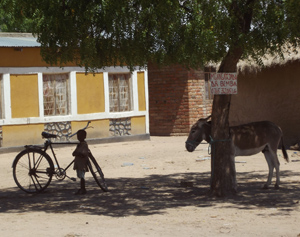Reading wins Gates Grand Challenge Award to explore the impacts of poverty on disease
Release Date 17 February 2014

The University of Reading has received $100,000 from the Gates Foundation, set-up by Microsoft founder Bill Gates and his wife Melinda, to examine the impact of poverty on human and animal disease.
As humans and animals share many of the same diseases, the aim of the grant is to explore the creation of a single health metric to measure the influence of poverty on global health. It is currently estimated that there are 1.2 billion smallholders globally who are dependent on livestock for their livelihoods. Often these smallholders live in poor conditions with basic sanitation, which leaves themselves, and their animals, vulnerable to diseases which can transfer from animals to man such as tuberculosis, rabies and Rift Valley Fever.
Through the Bill & Melinda Gates Foundation award Dr Claire Heffernan at the Livestock Development Group will develop a mathematical model to measure the combined impact of a range of diseases on these households.
Dr Claire Heffernan said: "We are delighted to have received this award from the Bill & Melinda Gates Foundation. At present, the majority of emerging infectious diseases impact both human and animals. In the coming decades poverty is expected to be a key driver of disease increase. We are currently working in collaboration with World Health Organisation and The World Organisation for Animal Health who are interested in applying the tool to global datasets on human and animal disease. This will allow them to target their resources more effectively, particularly with regard to diseases passed between animals and humans and diseases impacting both animals and humans such as TB and Avian Flu."
The University has received the funding through round 11 of the Grand Challenges Explorations (GCE) awards, a US$100 million initiative funded by the Bill & Melinda Gates Foundation. GCE grants fund innovative ideas to tackle persistent global health and development problems. Launched in 2008, the Global Health awards have funded 850 research projects from a pool of over 40,000 global proposals.
